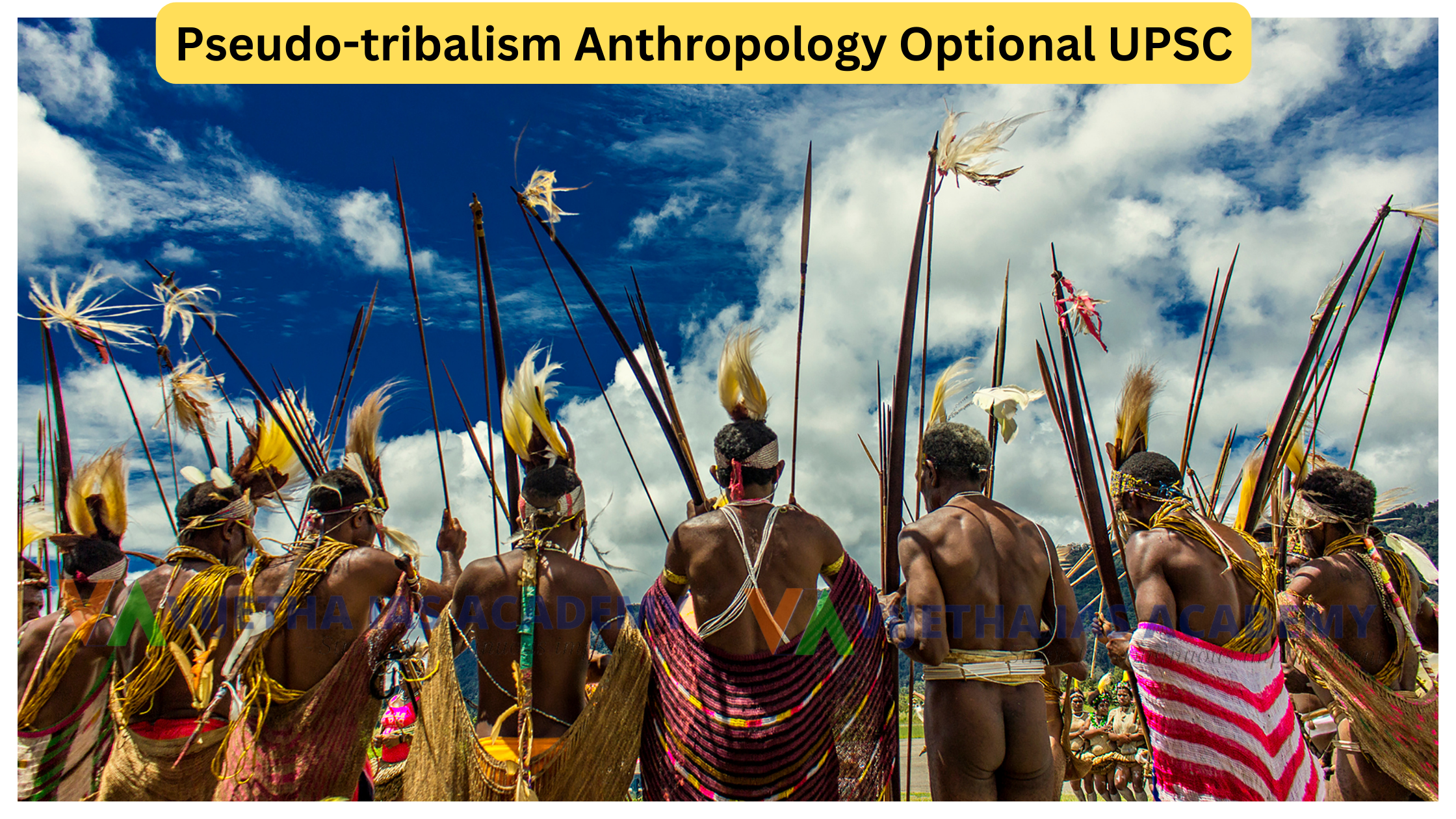
Pseudo-Tribalism: An Anthropological Insight for UPSC Aspirants
Pseudo-tribalism is a complex and evolving phenomenon within the field of anthropology. For UPSC aspirants choosing Anthropology as their optional subject, understanding this concept is crucial. This article delves into the intricacies of pseudo-tribalism, offering valuable insights and resources, such as the esteemed Vijetha IAS Academy and the expert guidance of Kishore sir Anthropology.
Understanding Pseudo-Tribalism
Definition and Context
Pseudo-tribalism refers to the adoption or simulation of tribal identities by non-tribal groups for various socio-political and economic advantages. This phenomenon often involves the appropriation of tribal cultural symbols, practices, and affiliations to gain access to benefits meant for indigenous populations, such as reservations, land rights, and social welfare schemes.
Historical Background
The roots of pseudo-tribalism can be traced back to colonial and post-colonial policies that recognized certain groups as "tribes" and granted them specific rights and protections. Over time, the socio-economic disparities and political marginalization faced by non-tribal communities led to the strategic adoption of tribal identities to avail these benefits.
Causes of Pseudo-Tribalism
Socio-Economic Disparities
Economic inequality and lack of access to resources are primary drivers of pseudo-tribalism. Non-tribal communities, often struggling with poverty and unemployment, may adopt tribal identities to gain access to reserved jobs, educational opportunities, and financial aid.
Anthropological Perspective:
- Examines the socio-economic conditions that lead to the adoption of tribal identities.
- Analyzes the impact of pseudo-tribalism on genuine tribal communities.
Political Marginalization
Political exclusion and the desire for greater representation can also lead to pseudo-tribalism. Non-tribal groups may claim tribal status to increase their political influence and secure reserved seats in legislative bodies.
Anthropological Perspective:
- Studies the role of political structures and policies in promoting pseudo-tribalism.
- Analyzes the implications of pseudo-tribalism on political representation and governance.
Cultural Assimilation
The cultural assimilation of non-tribal groups into tribal societies can blur the lines between genuine and pseudo-tribal identities. This assimilation can occur through intermarriage, adoption of tribal customs, and participation in tribal rituals.
Anthropological Perspective:
- Examines the cultural processes that facilitate the assimilation of non-tribal groups.
- Analyzes the impact of cultural assimilation on tribal identity and heritage.
Case Studies of Pseudo-Tribalism
The Bodo-Kachari Issue in Assam
In Assam, the Bodo-Kachari communities have faced challenges with pseudo-tribalism. Some non-tribal groups have attempted to identify as Bodos to access benefits meant for Scheduled Tribes, leading to conflicts and tensions.
Anthropological Perspective:
- Studies the historical and cultural context of the Bodo-Kachari communities.
- Analyzes the socio-political impact of pseudo-tribalism on genuine Bodo tribes.
The Gonds in Central India
The Gond community, one of the largest tribal groups in India, has also witnessed instances of pseudo-tribalism. Non-tribal groups in central India have sought to identify as Gonds to gain access to reserved resources and opportunities.
Anthropological Perspective:
- Examines the socio-economic conditions of the Gond community.
- Analyzes the strategies and outcomes of pseudo-tribalism in central India.
The Gujjars in Rajasthan
In Rajasthan, the Gujjars have demanded Scheduled Tribe status, leading to conflicts with existing tribal groups. The Gujjars argue that they face similar socio-economic disadvantages and deserve the same benefits as recognized tribes.
Anthropological Perspective:
- Studies the historical and socio-economic context of the Gujjar community.
- Analyzes the implications of granting tribal status to non-tribal groups.
Addressing Pseudo-Tribalism: Policy Measures and Recommendations
Strengthening Verification Processes
To curb pseudo-tribalism, it is essential to strengthen the verification processes for granting tribal status. This includes thorough scrutiny of historical records, cultural practices, and genealogical evidence.
Anthropological Perspective:
- Examines the effectiveness of current verification processes.
- Analyzes the challenges in implementing stringent verification measures.
Ensuring Equitable Development
Addressing the root causes of pseudo-tribalism requires ensuring equitable development for all socio-economically disadvantaged groups. This involves creating inclusive policies that provide opportunities for non-tribal communities without compromising the rights of genuine tribal populations.
Anthropological Perspective:
- Studies the impact of inclusive development policies on socio-economic disparities.
- Analyzes the role of equitable development in reducing pseudo-tribalism.
Promoting Cultural Preservation
Preserving the unique cultural identity of genuine tribal communities is crucial to preventing cultural assimilation and pseudo-tribalism. This can include initiatives to document and promote tribal languages, traditions, and practices.
Anthropological Perspective:
- Examines the role of cultural preservation in maintaining tribal identity.
- Analyzes the impact of cultural initiatives on social cohesion and well-being.
Anthropological Insights for UPSC Aspirants
For UPSC aspirants, understanding the causes and implications of pseudo-tribalism is essential for Anthropology Optional. It involves analyzing the socio-economic, political, and cultural dimensions of pseudo-tribalism and evaluating policy measures to address these issues.
Key Areas of Study
- Theoretical Approaches: Understanding the theories related to pseudo-tribalism and identity formation.
- Case Studies: Analyzing real-life examples of pseudo-tribalism and their outcomes.
- Policy Analysis: Evaluating the effectiveness of development, verification, and cultural preservation policies.
- Cultural Studies: Understanding the role of cultural identity and preservation in tribal communities.
Preparation Resources
To master this subject, aspirants can utilize resources from Vijetha IAS Academy, which offers specialized courses tailored for Anthropology Optional. The academy's comprehensive study material and expert faculty, including Kishore sir Anthropology, provide invaluable support for thorough preparation.
Conclusion
Pseudo-tribalism is a complex and multifaceted issue that requires a deep understanding of socio-economic, political, and cultural factors. For UPSC aspirants, mastering this topic within the Anthropology Optional syllabus is crucial for a well-rounded preparation.
By leveraging resources like Vijetha IAS Academy and the expert guidance of Kishore sir Anthropology, aspirants can develop a comprehensive understanding of pseudo-tribalism and its implications. This knowledge will not only aid in their UPSC preparation but also equip them to contribute meaningfully to the discourse on tribal development and social justice.

-1731656719892.jpg)